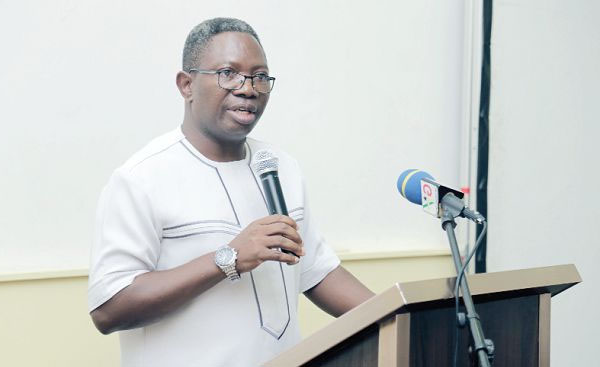Dr. Kyeremeh Atuahene
Some 20,068 Ghanaians were infected with HIV in 2019 according to the national and sub-national estimates of HIV/AIDS prevalence.
This adds up to 342,307 people living with the virus in the country.
The Ghana AIDs Commission (GAC) announced this at the launch of the 2020 World AIDs Day, in Accra.
The Commission called on the public to protect themselves against contracting HIV/AIDS to help reduce the disease burden in the country.
Director-General, GAC, Dr Kyeremeh Atuahene, noted that the growing disregard for HIV/AIDs preventive measures is accounting for the rise in infections urging that “all Ghanaians should help reduce new HIV infections by each one of us taking responsibility for self-protection at all times.”
“We should also support Persons Living with HIV (PLHIV) to take their anti-retroviral drugs religiously to attain viral suppression and reduce AIDs related deaths in the country,” he advised.
This year’s World AIDs Day slated for December 1, 2020 will be commemorated on the global theme: “Global Solidarity, Shared Responsibility.”
In Ghana, the day is being marked on the sub-theme; “Stay Safe; Let’s End AIDs by 2030”, to stimulate national and collective efforts at reducing HIV/AIDs prevalence in the country.
Activities lined up for the month-long celebration include HIV testing, media and public sensitization as well as engagement with religious bodies to drum home the gravity of HIV/AIDs prevalence and the need for all to stand together and play their respective roles to control the epidemic.
Mr Atuahene indicated that although Ghana had missed out on the UNAIDs 90, 90, 90 target which envisages that by the end of 2020, 90 per cent of all PLHIVs globally will know their status, 90 per cent of persons diagnosed of HIV put on antiretroviral drugs and 90 per cent attaining viral suppression, a new target to end the epidemic by 2030, was feasible.
Ghana, he said, was set to implement a new national HIV/AIDs strategic plan (2021 to 2025) in line with a global 2030 target to end AIDS saying, “ending AIDs by 2030 is feasible only if we work with a renewed commitment and active participation of all Ghtoorder to achieve the target.”
Mr Atuahene submitted that under the new strategy, Commission will by next year roll out HIV self-testing to encourage more people to test for the virus at any given time and seek immediate medical attention should the tests prove positive.
He said, the Commission was also working with its partners to implement provisions under the GAC Act to sanction persons who stigmatise and discriminate against persons who live with HIV and other vulnerable populations.
“The success of this strategy and others depend on every individual. We all have to show accepting attitude towards PLHIV and their families,” he urged.
The Presidential Advisor on HIV, Dr Mokowa Blay Adu-Gyamfi, who launched the event expressed government commitment to “deal with all epidemics that pose significant public health challenge to Ghanaians.”
She urged “all to join the government in bringing into reality quality, accessible and affordable healthcare under the universal healthcare for all Ghanaians and also end AIDs by 2030.”
On his part, the Director-General of the Ghana Health Service (GHS), Dr Patrick Kuma-Aboagye admonished Ghanaians against being complacent with HIV/AIDS preventive measures as the country grapples with containing the Covid-19 pandemic.
“Staying safe from HIV infections means adopting a comprehensive combination of prevention and promotion strategies inthe cluding use of condoms, accessing testing and treatment services and observing all Covid-19 protocols strictly to prevent complications especially among PLHIVs,” he urged.
President of the Network of Association of Persons Living with HIV (NAP+), Elsie Ayeh appethe appealed to the government to allocate more resources to the fight against HIV/AIDs.
By Jamila Akweley Okertchiri


